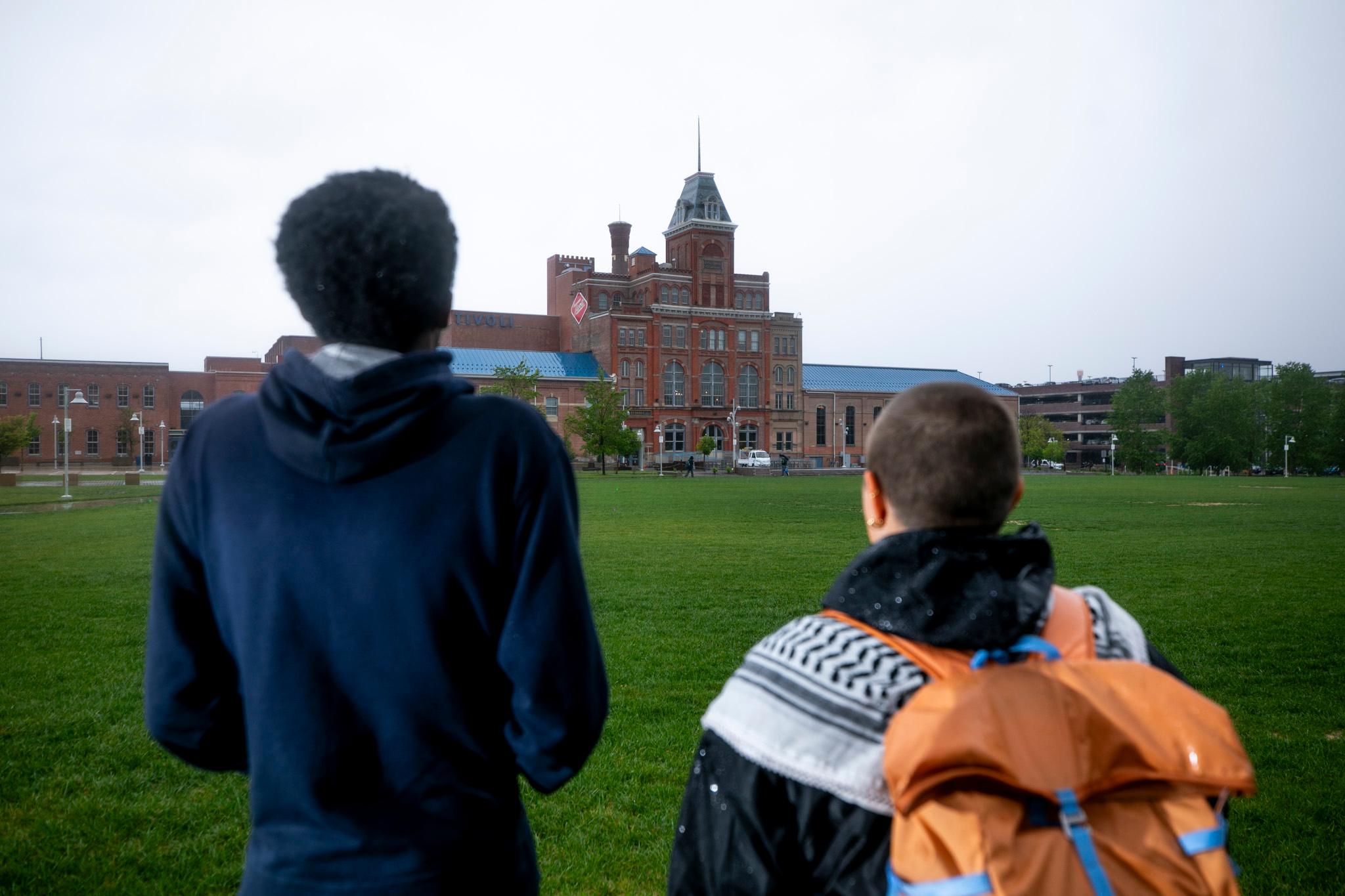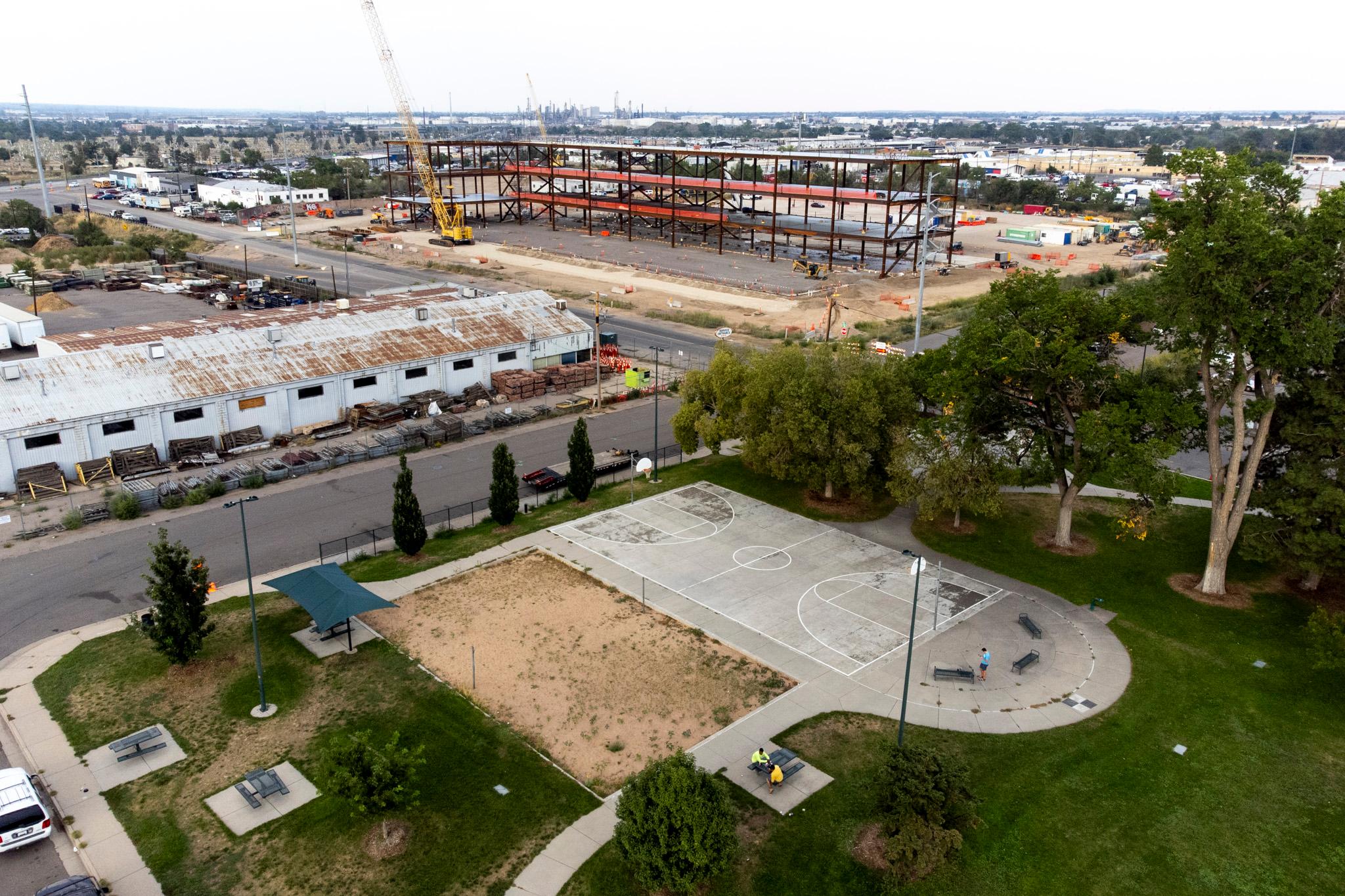A lot can change in a year. Just ask Khalid Hamu, one of the student organizers behind an anti-war camp that occupied the center of Denver’s Auraria Quad for nearly a month last spring.
A year ago, Hamu’s life was soundtracked by loud punk music and protest chants. Between classes, he would organize activities at the encampment or prepare for difficult conversations with university leaders. All the while, he was working on finishing his junior year, with the possibility of applying to graduate school.
Hamu’s life is far quieter today. He’s set to graduate with a degree in computer science, but he thinks that degree will mark the end of his academic career — an example of how the protests are still reverberating through campus.
“My parents are immigrants, they're actually refugees, so there's this really high importance on education,” Hamu said while sitting in a quiet building on the Auraria Campus. “And now I'm just kind of like I will not enroll in another university ever again.”
Hamu was one of dozens of Auraria students who set up tents on the Tivoli Quad last April, joining a nationwide movement at college campuses. During the month-long camp, 40 people, including Hamu, were arrested and another 40 were issued citations as protesters attempted to get university leadership to take a stance on the war in Gaza and divest from companies that operate in Israel.
The camp ended rather unceremoniously on May 17, 2024, when protesters agreed to take their tents down. Students only saw one major demand met, with Metropolitan State University of Denver agreeing to disclose its investments in companies that operate in Israel.
But still, students who protested said it gave them hope.
“Divestment is a really long-haul struggle,” said Lucia Feast, one of the camp’s primary organizers. “I hope that the encampments hopefully started something that leads to really substantive changes for universities, but also for Palestine as a whole.”
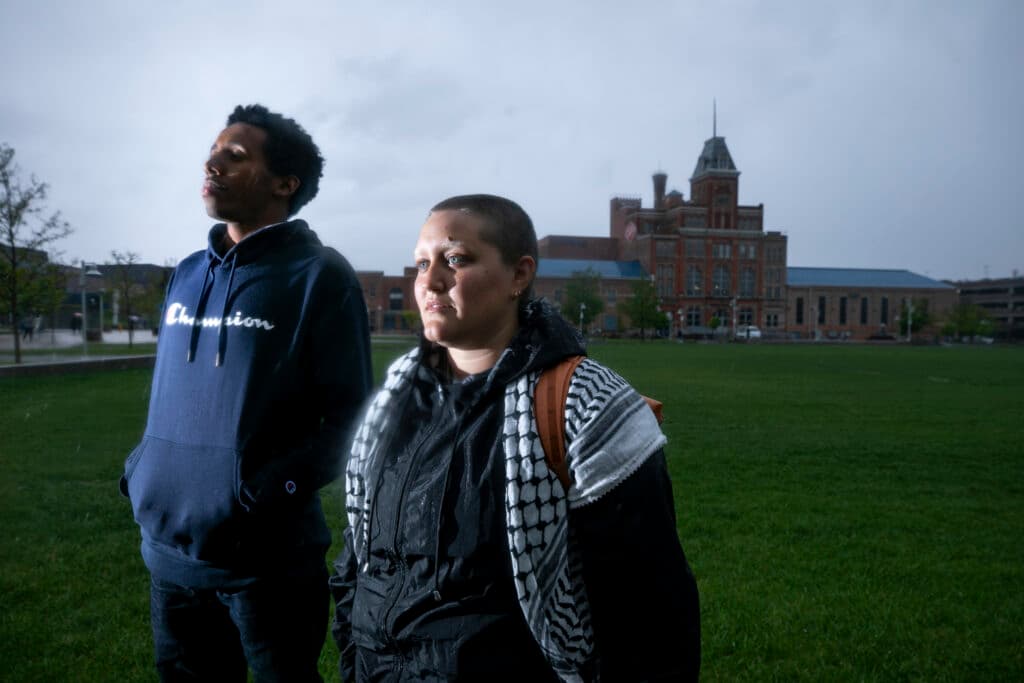
Using the Colorado Open Records Act, Denverite obtained previously undisclosed correspondence between university leaders about the protests as they unfolded, and spoke with those at the center of the Auraria anti-war camp, to reflect on the movement a year later.
The results showed how leaders treated the protesters while away from the public eye, and, for some students, raised questions about how the campus will handle protests against the new Trump administration.
Behind closed doors:
The records show disagreements occurred over how best to manage the encampment and the threat it could pose to the university campuses.
We found:
- Campus leaders turned down compromise proposals from local lawmakers.
- At least one campus leader was increasingly convinced that the protesters were not peaceful.
- The encampment allegedly cost the campus up to $15,000 per day due to the loss of events.
In the opening days of the encampment, Denver city councilmembers and progressive statehouse lawmakers pushed for more hospitality and better treatment of protesters.
Just after police arrested 40 protesters on the second day of the encampment, campus officials met with local and state lawmakers.
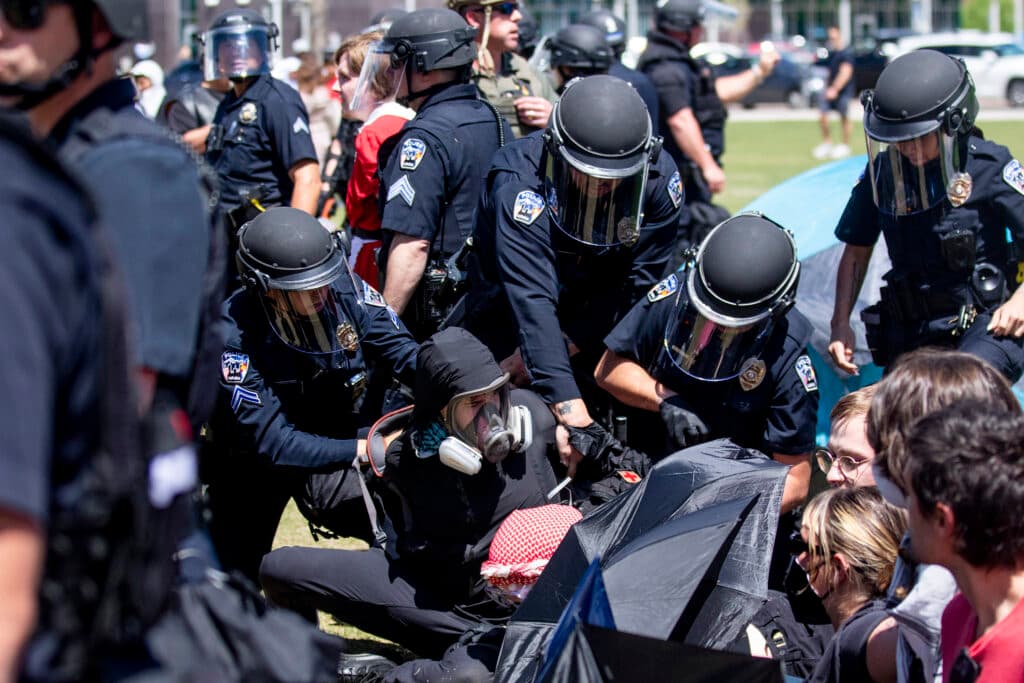
At the meeting, three members of Denver City Council, Sarah Parady, Serena Gonzalez-Gutierrez and Shontel Lewis, argued that the campus should foster an environment of free speech by waiving Auraria’s ban on camping, which was first enacted shortly after a similar anti-war camp formed during the Iraq War.
Lawmakers, including then-Rep. Leslie Herod, also said the campus should provide portable toilets as a sign of good faith. Student organizers told Denverite that the campus never followed through on that request.
“We had our own porta-potties that we paid for,” Feast said.
Records showed that campus officials considered those requests and other ways to compromise with student protesters, but ultimately didn’t follow through.
Shortly after the meeting with lawmakers, Auraria Chief of Staff Shaneis Malouff outlined an initial strategy to come to an agreement with the camp. The idea was to either make the student protesters rent the quad or move the camp to the campus baseball field.
“Any acts outside of these options highlight this demonstration’s focus not on protest and freedom of expression/speech, but rather antagonistic to conflict,” Malouff wrote in the email.
It is unclear if these options were ever presented to the camp organizers. In any case, Hamu said they likely wouldn’t have considered those options, but disagreed that it would have made them “antagonistic”.
‘These are not “peaceful protests”’: Records showed growing frustration among leaders
After the arrests in the initial days of the camp, the protest settled into a consistent pattern.
However, when protests began spreading beyond the quad — through indoor protests and marches around campus — due in part to negotiations between the camp and campus leaders breaking down — campus leaders, like Auraria Campus CEO Colleen Walker, grew more frustrated.
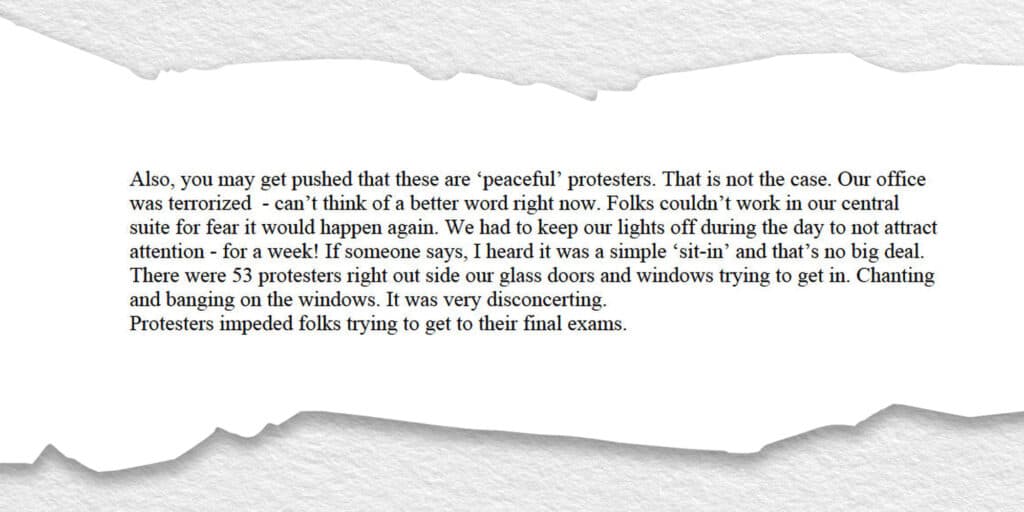
“They stormed my office Monday night, 12 got inside with another 53 students outside my locked doors, pounding on the glass and chanting to free Palestine and divest from Israel,” Walker said in an email.
By mid-May — the final days of the camp — Auraria Campus CEO Walker began characterizing the camp as “not peaceful”.
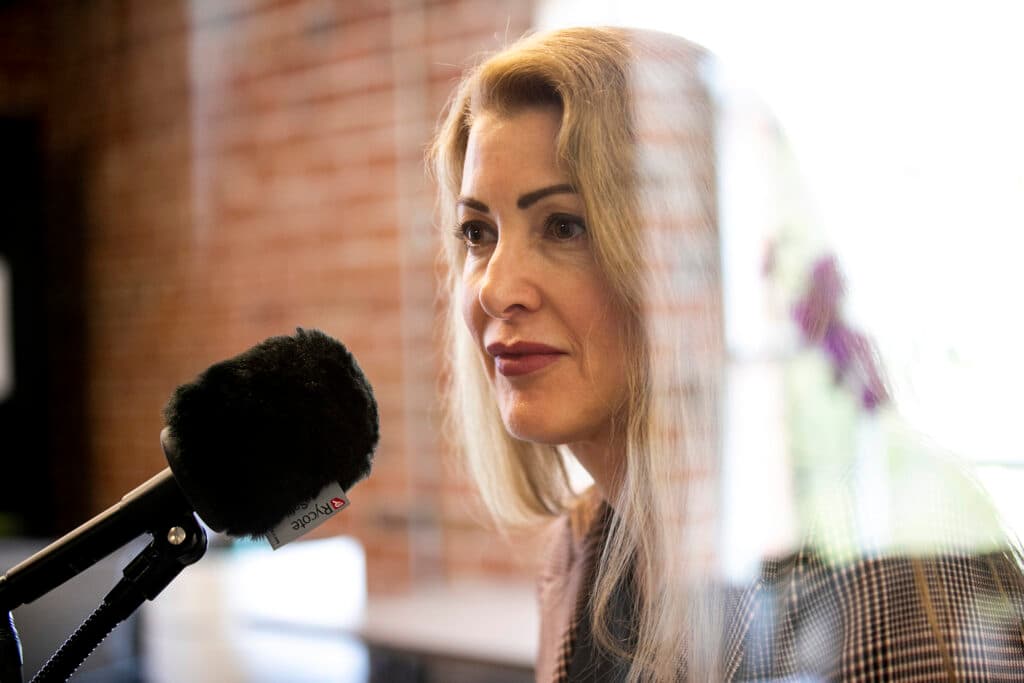
“You may get pushed that these are ‘peaceful’ protesters,” Walker wrote in an email to a staff member who was preparing for a meeting with Mayor Mike Johnston’s staff. “That is not the case.”
“Let’s be clear: these are not ‘peaceful protests’, and we cannot tolerate chronic intimidation, campus chaos and business disruptions,” Walker wrote in a separate email to Johnston’s chief of staff.
Videos shared by Walker showed student protesters banging on glass windows and protesting inside a private office.
Walker and the Auraria Campus declined an interview with Denverite. When Denverite sent them questions based on what was said in public documents, the campus spokesperson did not reply to the email.
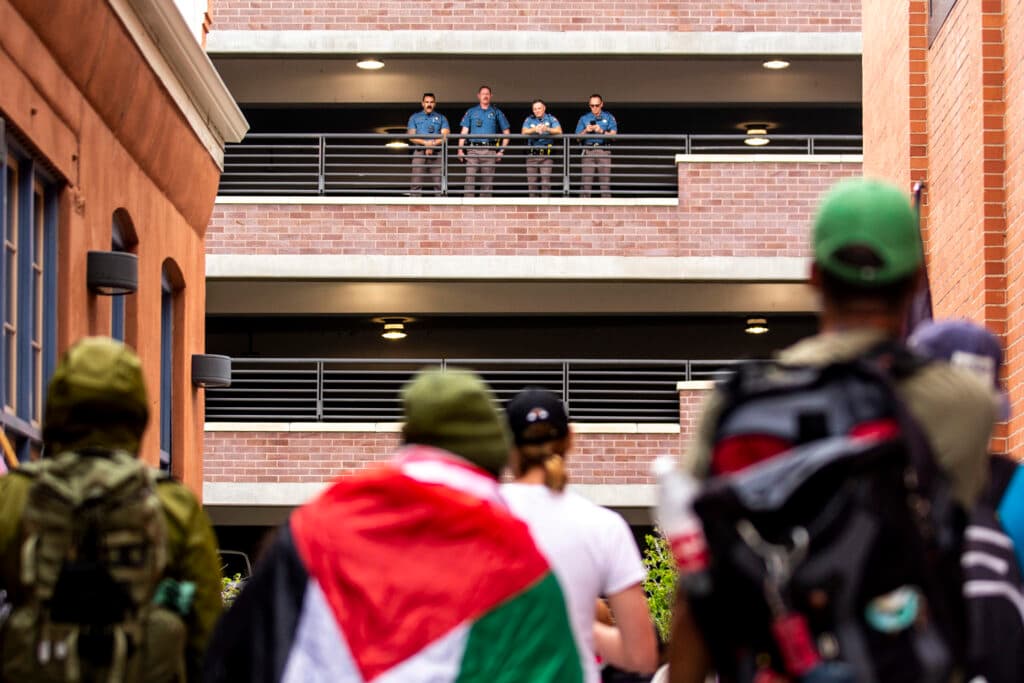
Records also outlined the financial impact the protest had on the campus. Walker said in an email to a staff member that the protest was costing the campus “$10k-$15k per day.”
One email detailed an agreement between the Auraria Campus and the Colorado Division of Homeland Security and Emergency Management. Through the agreement, the state and Auraria split the cost of incident response expenses, like “leadership briefings, resource requests, financial monitoring and public information efforts”.
In total, the cost of incident response was about $51,000. Auraria and the state split the cost.
Walker also wrote the executive office was “terrorized” and that people stopped working on campus, instead doing their jobs remotely, for “fear it would happen again.”

Protesters said they were following in the footsteps of student groups before them that protested U.S. foreign policy. They pointed to Vietnam War-era protests and a previous Auraria encampment during the Iraq War, which led school leaders to ban camping on the grounds.
Student organizers also disagreed with Walker’s claim that the protest wasn’t peaceful.
“I personally feel that there's a difference between violence against property and violence against people,” Feast said. “And to be clear, we never as a tactic went to damaging property either at our encampment.”
Denverite has not received public records from leaders of CU Denver and the Community College of Denver
Denverite’s public records requests centered on the heads of the four organizations. Of the four requests it sent, Denverite was only able to freely obtain records from the Auraria Campus and MSU Denver. A public records request for about 100 emails from CU Denver’s former Chancellor Michelle Marks was set to be delivered next week.
Denverite also sent a Colorado Open Records Act request to the Community College of Denver on April 4. CCD acknowledged Denverite’s CORA request on April 11, but never provided documents or sent an estimate of the cost to fulfill the request to Denverite.
In CCD’s last correspondence to Denverite, it said it expected to provide records by the end of this week, but hadn’t done so as of Friday afternoon.
Colorado law requires public entities to respond to a request within three business days; if an organization cannot fulfill the request within seven business days, it must notify the requester of the need for additional time.
The campus climate darkened following the response to the protest.
Dozens of people wrote to campus officials after the first round of arrests on April 26. Most were critical of the decision to arrest protesters.
“How can I still be proud to be an MSU Denver student after knowing that you not only allowed for this to happen, but explicitly called for it to happen to our own community?” wrote one student graduating from MSU Denver at the time of the protests, in an email to Janine Davidson, the university's president.
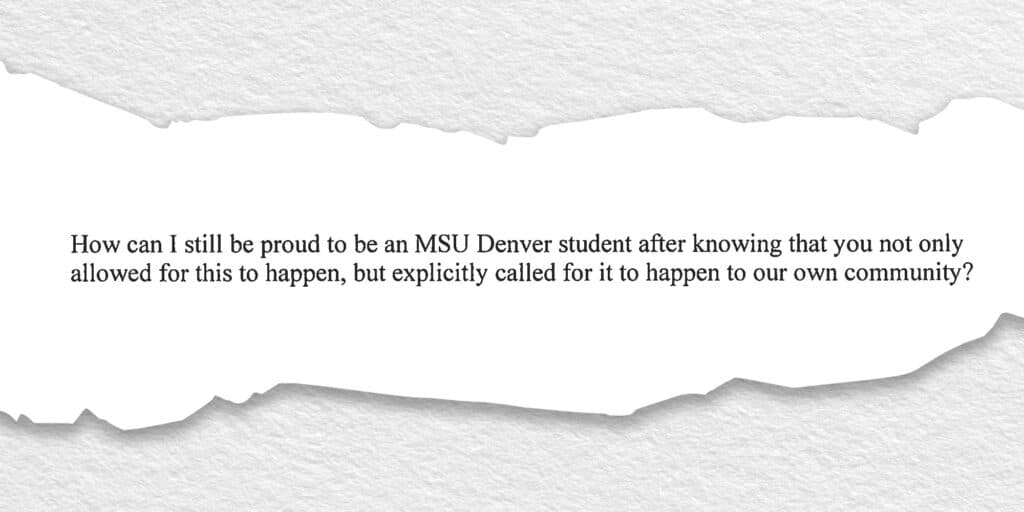
The mass arrests and presence of police led to significant concern on campus, MSU Denver found in a listening session.
Students, faculty and staff who participated in the listening sessions said the campus administration’s response to the protest — including the arrest of protesters — had sown mistrust.
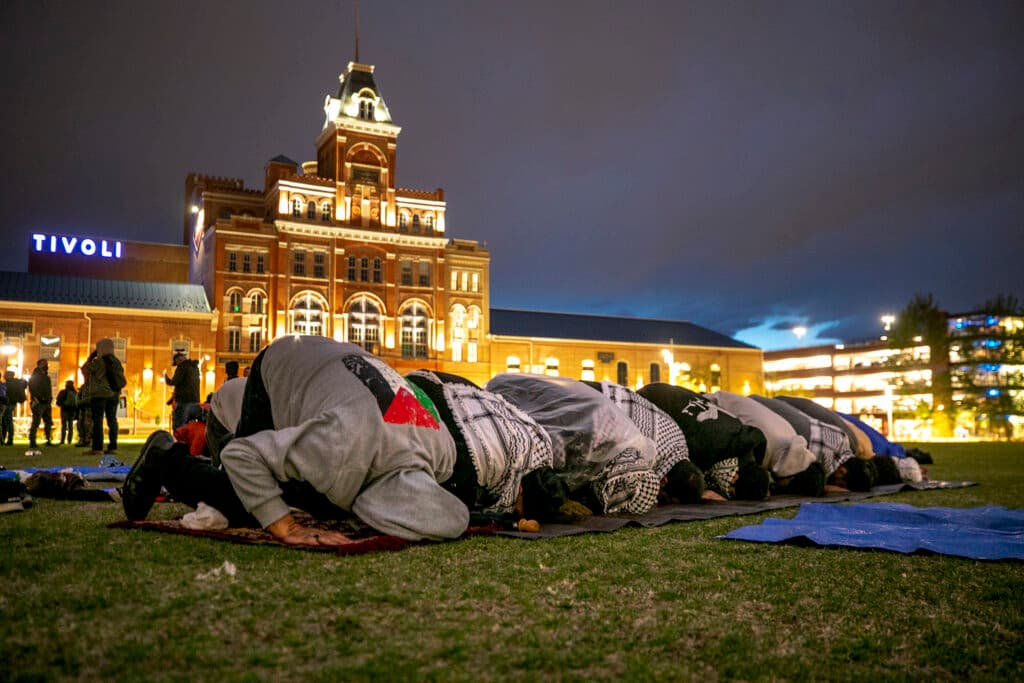
“Participants indicated that [Auraria Campus] leadership and university leadership were ‘building a case against student protesters,’” one section from the report said. “Participants noted that the language used in official messaging was ‘triggering and harmful to communities of color’ and felt reminiscent of language used to criticize racial justice protest movements.”
Participants said messaging from campus entities “painted student protestors as dangerous, or in need of punishment,” with terms like “lockdown,” “civil unrest” and “police presence” being highlighted.
The encampment drove a wedge between protesters and certain groups.
Many protesters who were arrested at the encampment had their charges dropped by the Denver City Attorney’s Office, who said the dismissals were in the interest of justice. Regardless, it took months for those charges to be dropped.
Student organizers said while they felt ostracized by university leadership, they never felt isolated from professors or classmates.
“I have relationships with professors and faculty and fellow students that I would not have otherwise,” Feast said.

The listening session also added that 17 respondents shared concerns about the encampment, while four shared concerns specifically about antisemitism. That’s something staff and students affiliated with Hillel of Colorado, a Jewish student life organization, have been paying close attention to.
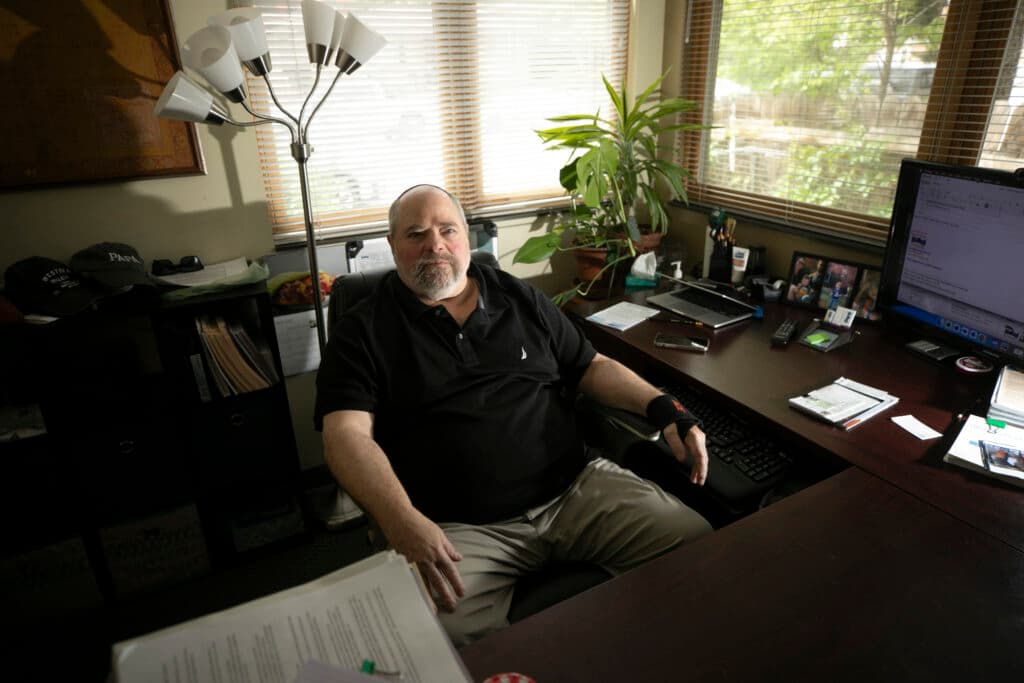
Daniel Bennett, Hillel of Colorado’s executive director, acknowledged that most protesters were protesting the Israeli government, but said some speech crossed the line into antisemitism.
“Unless you start from the premise that my people have a right to have a democratic independent state in their historic homeland, we can't really talk,” he said.
Responses within the report outlined “hateful messages” that reportedly surfaced during the protests, such as “We Are Hamas”, referring to the militant group that rules Gaza, and a protester stating “Hitler did nothing wrong.” The document noted that some reports of antisemitism were not based on firsthand experiences, and that some students believed “bad actors” had infiltrated the protest.
Student organizers have continually rejected accusations of antisemitism within the camp. In addition to hosting Jewish events in partnership with an anti-Zionist Jewish group, Hamu said they kicked people out of the camp who were harassing others.
“We oppose all forms of bigotry,” Hamu said. “It's kind of antithetical to our points of unity.”
The campus is still grappling with accusations of antisemitism. A federal civil rights panel will conduct a year-long review into claims of antisemitism at the Auraria Campus and its three universities.
Students and staff say the universities have to choose: Do they want to side with protesters or Trump?
Auraria Campus protests have since pivoted to focus on the Trump administration’s attacks on constitutional rights, like habeas corpus and birthright citizenship, and immigrants. But student organizers haven't been able to recapture the energy of last year's anti-war encampments.
Meanwhile, Trump’s crackdown on student protesters has continued. Members of his administration have described protesters as “lunatics” and stripped visas from some who had protested the war in Gaza.

In Colorado, at least 10 international students — at least half Middle Eastern — have had their visas revoked. Nationwide, there have been hundreds of revocations.
The Trump administration, which has made systemic cuts to its Department of Education, has set out to defund colleges in an attempt to force them to comply with a conservative agenda. While most of the budget cuts have targeted private universities, many in higher education worry it will eventually extend to the public sphere.
Harriet Falconetti, a junior at CU Denver who participated in the protests, said Auraria institutions haven’t proactively stepped up to protect students who might be targeted for protesting.
“I think the reason that universities have been trying to comply with the Trump administration, or at least avoid attention is because they're worried about losing federal funding or attracting negative press,” Falconetti said. “I think that, either way, they're going to lose federal funding.”
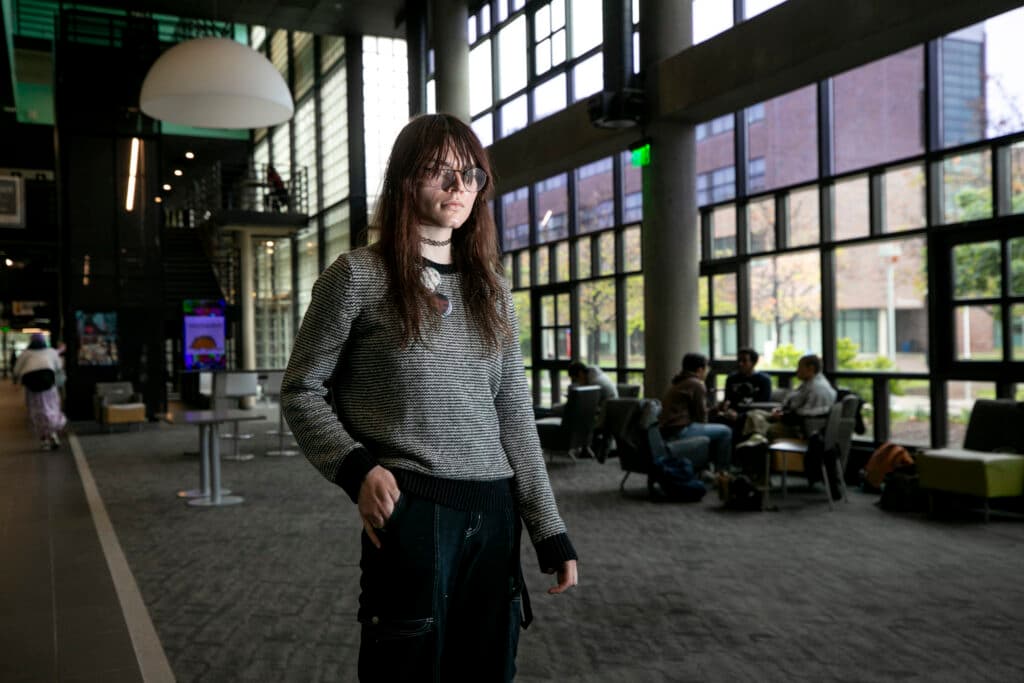
Alex Boodrookas, a tenure-track professor of history at MSU Denver, took Falconetti’s claim a step further. Boodrookas was never an active participant in the encampment, but was arrested on April 26 while stepping in to protect students and accepted invitations from camp organizers to give lectures about Middle Eastern history.
“Do I think the crackdown on encampments laid the groundwork for an authoritarian attack at universities across the country?” he said. “Yes, absolutely. There is no doubt in my mind.”

